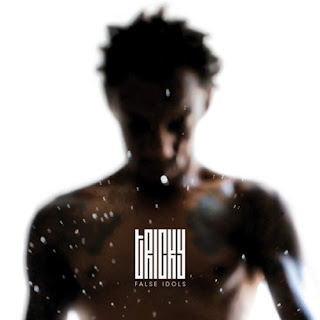Album Review: Tricky- False Idols
Tricky’s new album, False
Idols, claims that it is a “spiritual follow up” to his untouchably good
1995 debut LP Maxinquaye. The press
release for False Idols includes this
interesting sound byte-
“My last two albums, I thought they were good, but I realize
now they weren’t,” he says. “But this new album I’ll stand behind every track.
I don’t care whether people like it. I’m doing what I want to do, which is what
I did with my first record. That’s what made me who I was in the beginning. If
people don’t like it, it don’t matter to me because I’m back where I was.” And
as far as Tricky is concerned, False
Idols is every bit as good as his debut, perhaps even an improvement. “This
new record is better than Maxinquaye,”
he confirms. “There’s no doubt in my mind.”
So let’s just set the record straight. This album is not
better than Maxinquaye. That album
captures a time, a place, and a feeling that no other record Tricky manages to
shit out can capture. Even its follow
up, 1996’s Pre-Millennium Tension, as
delightfully terrifying and claustrophobic it is, it pales in comparison.
False Idols is
Tricky’s 8th proper studio album, in a solo career that spans nearly
20 years. Originally part of Massive Attack, he split from them as they were
writing Protection so he could begin
work on his debut. Interesting fact—he was supposed to be writing lyrics for Protection, but was so consumed with his
own work, that he just handed over recycled lyrics to Massive Attack. That’s
why “Karma Coma” from Protection, and
“Overcome” from Maxinquaye are pretty
much the same song.
To its credit, False
Idols is the most listenable album Tricky has released in a LONG time.
Like, well over a decade for sure. His run from 2001 to 2010 was pretty brutal,
littered with missteps, and as the quote above points out, music he can’t even
stand behind anymore.
This isn’t a bad album. But it’s also not a good album. It’s
really, really boring, and that is its fatal flaw. There are very few memorable
songs on it—most of them rely heavily on the male/female vocal dichotomy he
established on his debut—a strong female vocalist taking the lead, while he
stays in the background, whispering and mumbling in his raspy, cockney accent.
When executed successfully, it can be unsettling, and powerful. When executed
poorly, you’re just kind of like, “Oh god not this again.”
In his heyday, Tricky relied on his chanteuse and romantic
partner at the time—a 20-year-old Martina Topley-Bird. Following his 1998
effort Angels With Dirty Faces, they
had a falling out, and she has not appeared on a record with him since,
although they did reunite to perform Maxinquaye
in its entirety, live, a few years back. Now, Topley-Bird has been primarily
replaced with Francesca Belmote, who is featured heavily on False Idols.
False Idols gets
off to a rocky start, but attempts to find its footing by the 5th
track, “Parenthesis”—one of the heavier tracks on the album that features some unhinged
guitar work. The album’s first single, the meta “Nothing’s Changed,” is still
one of the better songs of the set—but maybe that’s because it’s a
reinterpretation/continuation of the song “She Makes Me Wanna Die” from Pre-Millennium Tension. “If Only I Knew”
is a decent enough slow jam, and “Is That Your Life” works its way into a dark,
yet funk-based vibe.
As the album hits the halfway point and begins its descent,
the songs become pretty base and somewhat vapid. Another fatal flaw plaguing False Idols is that there’s no real
substance to this album. There’s nothing life changing, nothing that is going
to stick with you for, like, 16 years. I mean, parts of Pre-Millennium Tension still have me as shook today as they did
when I was a 13 year old kid, hearing it for the first time.
Musically, there are still some interesting ideas as this
record winds down. “Tribal Drums” is based around, well, tribal drums, but also
a cool, arrhythmic vocal sample, while “Does It” keeps things sparse with the
main focus being on the heavy duty bass line, accompanied by a very simple drum
machine beat, over which Tricky delivers such poignant lines as “Does it make
you feel good? Does it make you feel hood?”
Well does it? You don’t have to answer.
And it’s only by the final track that Tricky reaches any
kind of comparable level of menace and dread—the kind of things you want to
hear from him. “Passion of The Christ” plods a long with a steady, quick tempo,
as Tricky mumbles some shit, and a haunting, eerie string sample continues to
play throughout.
False Idols is not
a groundbreaking album. Nor will it be an influential album. And chances are,
it will not be talked about 18 years after release, lauded for its originality
and timelessness. Kudos to Tricky for making the kinds of records that he
“wants to” make, and for not caring what people think of them. At the quote at
the start of this, he says he is “back where he was.” That’s not necessarily
true. False Idols proves that Tricky is
actually really far away from where he was—with each album he has released, he
is attempted to run further away from the Maxinquaye
sound he pioneered. Rather than embracing what he created, he tried so hard to
abandon it. This isn’t like a, “is it better to burn out than to fade away?”
kind of question.
False Idols isn’t
phoned in. But it’s also another inessential Tricky record. This is the sound
of a talented, stubborn artist, who has been unsure of what to do with his
talent for the last 15 years.
